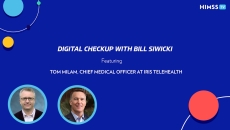Workforce
Regulatory difficulties, workforce shortages, financial pressures, evolving patient expectations, an aging population and more will combine to make the next year uniquely challenging, say tech company CEOs, but they're challenges that can be met.
Data shows hospitals lost 2.47% of their workforce last year. RNs left at an alarming rate.
Workforce challenges, patient engagement efforts, ongoing interoperability hurdles and some big announcements from legacy EHR and Big Tech players were among the news and reports that captured the most attention this past year.
The CIO of Penn Medicine says 2023 will be another year of significant change, requiring organizations to display nimbleness and teamwork to execute their strategic plans.
SPONSORED
Collaborating to address medical device cybersecurity issues.
"As clinicians are passionate about patients receiving quality healthcare delivered in a timely manner, I see telehealth programs being the key to improving patient outcomes and the overall healthcare experience," he says.
Racial minorities and women are continuing to make inroads into the field as total enrollment in medical colleges increases.
Ed Gaudet, CEO and founder of Censinet, says collaboration is key as organized crime shakes down healthcare – resulting in dangerous diversions of care, patient data compromise and loss of resources.
The newly created position will be filled by Dr. Curtis L. Cole, Weill Cornell Medicine's assistant vice provost for information services and CIO. The health system's deputy CIO Vipin Kamath will be promoted.
Amidst a nationwide psychiatrist shortage, hospitals are turning to telemedicine as demand for behavioral health services mounts. Dr. Tom Milam, chief medical officer at Iris Telehealth, offers perspective.









